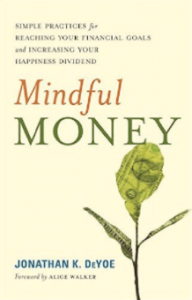 My first book, Mindful Money: Simple Practice for Reaching Your Financial Goals and Increasing Your Happiness Dividend, just came out, so the last few weeks have been a flurry of radio interviews and satellite television appearances. I’ve talked to folks from Berkeley, CA, Buffalo, NY, and several points in between, and no two interviews have been the same.
My first book, Mindful Money: Simple Practice for Reaching Your Financial Goals and Increasing Your Happiness Dividend, just came out, so the last few weeks have been a flurry of radio interviews and satellite television appearances. I’ve talked to folks from Berkeley, CA, Buffalo, NY, and several points in between, and no two interviews have been the same.
Some people are really curious about my Buddhist background, others want to know my “secret” for investment success, and still others are looking for my take on the stock market now that we have a new president. But there is one question I have been asked in pretty much every single interview: What is the one thing I should do if I want to be financially successful?
This is not a new question to me. I’ve been a financial advisor for over twenty years now, and it’s the exact same question everyone always asks when they sit down in my office for the first time.
Usually, the person asking thinks they already know the answer, which is often expressed as another question: Should I save more for retirement? Get a better paying job? Stop sitting on the sidelines and start investing? Although these are all steps that can help you reach your financial goals, you don’t want to hit the road until you know where you’re heading. That’s why the first and most important step to financial success is creating a financial plan that is firmly rooted in your personal values and inspired by what makes you truly happy.
A financial plan serves as your roadmap to the life you want to live today and tomorrow. A plan gives your day to day financial decisions a well-developed context, and it provides you with a detailed set of action steps to follow towards the future you envision. When you’re tempted to stray off the path by some shiny new toy or can’t miss investment opportunity, your plan puts you back on track. Without a plan, you have no compass, so you’re easily led astray by market or media mania.
Once you’ve taken the time to consider what matters most to you, making the financial tradeoffs we all have to make gets easier. You know how much you need to save, so you also know how much deviating from your savings plan will cost you. You know that if you stick to your investment discipline in good markets and in bad, you can build the lifetime income stream you need, so you’re able to stay the course when short-term volatility hits.
As markets shift up or down, a plan keeps you heading in the right direction. As pundits pontificate, presidents are elected, or economic rules shift, you consult your map, ignore the backseat drivers, and recognize that these roadblocks too shall pass. Things that look gigantic today will appear infinitesimal in your rearview mirror twenty years down the road.
A life well-lived will be full of detours – some far more pleasant than others. If we’ve taken the first, critical step of creating a financial plan, we’ll be able to reach our goals and navigate our way to financial success, no matter what crosses our path.

